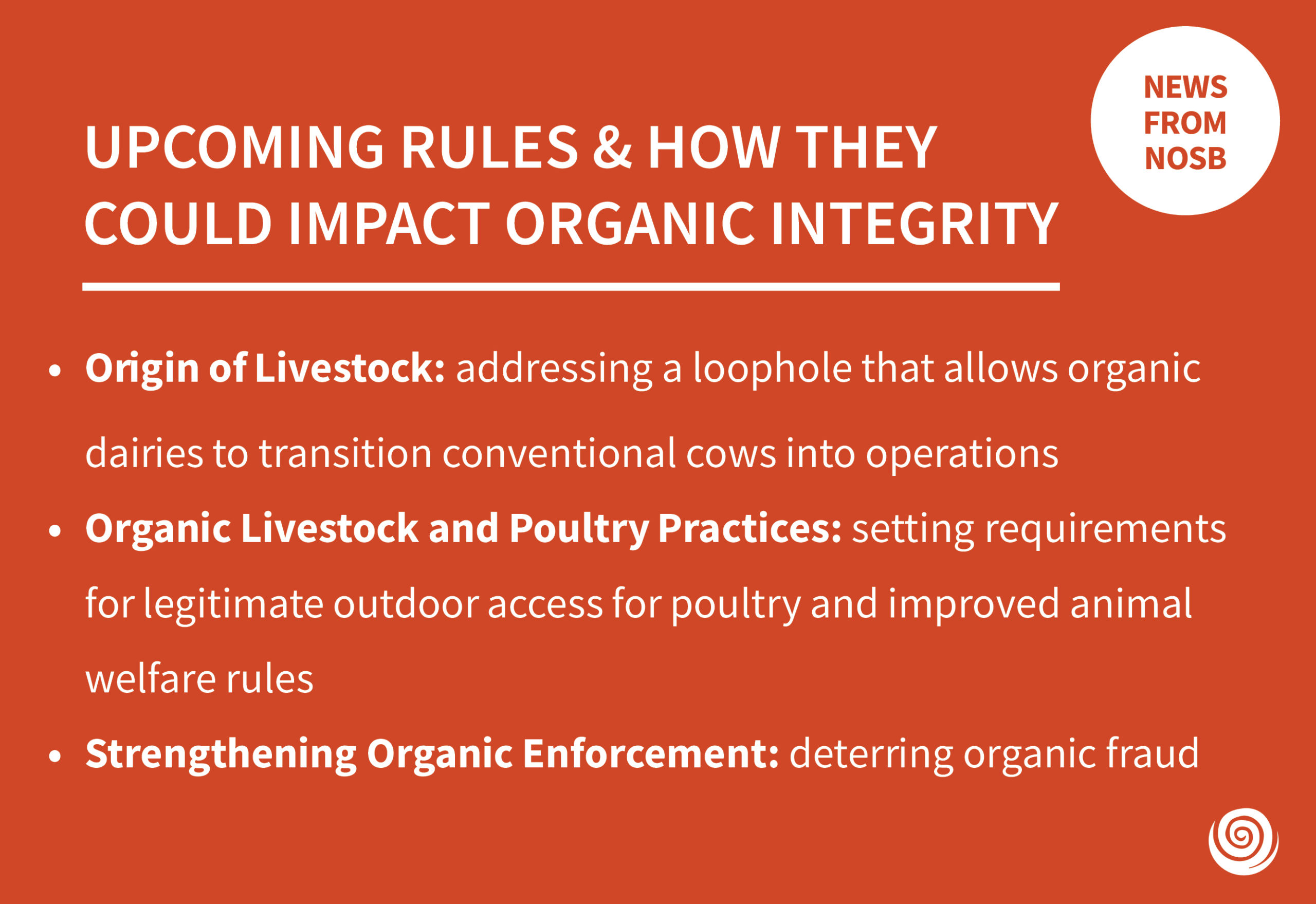This week’s National Organic Standards Board meeting was lively. Dr. Jennifer Tucker, Deputy Director of the National Organic Program, announced encouraging news: The NOP will hopefully publish the final Origin of Livestock and Strengthening Organic Enforcement rules in spring 2022, with the Organic Livestock and Poultry Practices Rule to follow on their heels. [More on this as it unfolds.]
Dr. Tucker asked that oral comments avoid disparaging remarks, noting that she and others had been “disturbed” by some written comments. Two speakers were muted and not allowed to finish their statements because they specifically called out unflattering actions by industry.
One of the muted parties was a lawyer who said his First Amendment rights had been violated. Cornucopia questions the wisdom of imposing a subjective rule about “disparagement” at a federal, public meeting.
Hackles were raised over a contentious discussion of whether organic ammonia extracts ought to be allowed in organic production.
Cornucopia supports a prohibition of ammonia extracts, and we note that many of the commenters asking to use them employ very few crop rotations or cover crops. The farmers on Cornucopia’s board call that “input substitution.” Instead of growing soil fertility using best organic practices, some farmers are relying on a quick hit of nitrogen — like we see in conventional ammonia applications.
The NOSB ultimately voted to prohibit stripped and concentrated ammonia from use in organic production. The subcommittee was tasked with continuing to work on a general prohibition of high-nitrogen products.
The vote to prohibit ammonia extracts was heartening, however the NOP will need to agree for the prohibition to go into effect. At least one ammonia extract has been approved for use by organic material review organizations since 2012.
In a truly discouraging vote, the NOSB decided to keep carrageenan on the list of substances allowed in organic food for another five years, despite the additive’s known health impacts and the inability of consumers to reliably identify or avoid it in organic food (since it need not always appear on labels).
This failure extends to the NOP. Prior to 2013, when the NOP opted to turn the sunset review process on its head, this vote would have been sufficient to remove carrageenan from the National List. Five NOSB members voted to relist carrageenan and nine voted to remove it from use. A two-thirds majority was previously required to keep items on the National List, but that same super-majority is now required to remove items from the list.
“It’s painful to watch members of the NOSB apparently ignore the desires of the majority of organic stakeholders and the most recent science on the issue,” says Kestrel Burcham, Cornucopia’s Policy Director. “Any materials allowed in organic food are supposed to meet a higher bar for human health. Carrageenan does not meet that bar.”
The outcome of this vote flippantly conflicts with a previous board decision: the 2016 NOSB recommended removing carrageenan due to consumer pressure across the marketplace — underscored by a Cornucopia petition with over 40,000 signatures.
In 2018, the NOP, led by USDA Secretary Sonny Perdue, overruled that recommendation, stating that it “found sufficient evidence in public comments to the NOSB that carrageenan continues to be necessary for handling agricultural products because of the unavailability of wholly natural substitutes.” (To learn more, read the history of our efforts to remove carrageenan from organic food.)
Cornucopia’s Guide to Avoiding Carrageenan in Organic Food shows that carrageenan is not needed. Countless brands have reformulated their products to remove carrageenan.
“This week, members of the NOSB disrespected the careful deliberations of the 2016 board members, and several board members completely ignored all of the recent research showing that carrageenan makes people sick. It was like the Twilight Zone,” says Cornucopia Executive Director Melody Morrell.
Other votes:
-
- The NOSB declined a petition to add kasugamycin, an antibiotic petitioned to control fire blight on apples and pears, to the National List. Cornucopia applauds this vote; antibiotics have no place in organic food.
- Bio-based mulch will now need to be at least 80% biobased and demonstrate at least 90% biodegradation in soil in less than two years. This is a change from the old requirement that these mulches — none are commercially available yet — must be 100% biobased. The NOSB’s hope was that this would create a market incentive for the manufacture of biobased films, lessening reliance on plastic polyethylene films which have multiple environmental concerns, including that they cannot be recycled leading to more plastic in landfills. Any biodegradable biobased mulch film will still need to be produced without organisms or feedstock derived from excluded methods.
- Chilean nitrate (sodium nitrate) processed from mined minerals in Chile was officially put back on the National List. In 2011, the NOSB voted to remove it, but the NOP determined it was widely in use and could not be de-listed for economic reasons. (The NOP is tasked with preventing economic harm while the NOSB is not allowed to consider it in deliberations.) In the interim, this very high-nitrogen fertilizer has been in regulatory limbo while still in use: Because it’s listing is outdated, there have been no more sunset reviews and there are technically no limits on its use (it was initially allowed to supply up to 20% of a crop’s nitrogen). The NOSB decision to reinstate this listing allows a path forward to a permanent removal. Chilean nitrate is prohibited by the organic standards of Mexico, Canada, and the EU.
Read Cornucopia’s notes from oral comments and the three-day NOSB meeting for more details.


